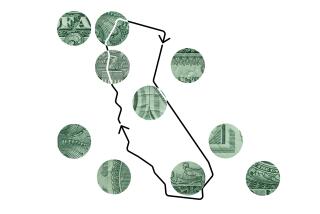Seymour Releases His Tax Returns : Politics: U.S. senator paid no state or federal income levy in 1990. After claiming deductions and business losses, he and his wife have paid a total of $131,158 since 1981.
SACRAMENTO — U.S. Sen. John Seymour, a self-described millionaire, paid no state or federal income taxes in 1990 because his deductions were more than his adjusted income of $67,861, according to copies of tax returns Seymour made public Friday.
The annual returns, going back to 1981, also show that Seymour and his wife, Judy, paid no federal taxes in 1984 and reduced their taxable income throughout the decade by reporting more than $380,000 in business losses.
They paid a total of $131,158 in federal and state income taxes on adjusted income of $918,608 between 1981 and 1990.
Seymour, a former state senator from Anaheim who was appointed to the U.S. Senate by Gov. Pete Wilson in January, could not be reached for comment on the returns, which his campaign office released Friday. No one on Seymour’s Senate staff or his campaign team could answer questions about the returns.
Seymour released the returns to answer a challenge from Rep. William E. Dannemeyer of Fullerton, his opponent in next year’s Republican primary. Dannemeyer released his income tax returns in June and called on Seymour to do the same.
On Friday, Dannemeyer’s campaign spokesman subtly questioned Seymour’s repeated claim that he is a millionaire--although there is no way to calculate net worth from tax data.
“It certainly doesn’t look like the tax returns of a millionaire,” said spokesman Roger Scott. “Congressman Dannemeyer is glad that Seymour released his taxes--just as he did. The public has a right to know how its elected officials make their money.”
For the 10-year period, Seymour reported gross income of about $1.3 million from his legislative salary, real estate investments and his wife’s salary in the real estate business.
The business losses and the Seymours’ personal deductions, mostly mortgage interest and state and local taxes, brought their taxable income for the period down to $344,291. On that amount, they paid federal taxes of $99,598 and state income taxes of $31,560.
Not once during the 10-year period did the Seymours report a profit from the total of more than three dozen rental properties they owned. Although some of the losses were on paper in the form of depreciation, most of the red ink was a result of negative cash flow. Their reported expenses usually exceeded the rents they collected.
In 1984, the Seymours reported adjusted income of about $32,400 but paid no federal taxes. Their taxable income was reduced to less than zero by deductions of more than $52,000, including interest expenses exceeding $37,000.
In 1990, the Seymours reported adjusted income of $67,861. Their deductions came to $67,989, leaving them again with no tax liability.
The returns also give the details of the sale of Seymour’s real estate business, which he founded in 1964. Seymour sold the business in 1981 to William Cooper, an Orange County businessman, but Cooper was unable to keep the firm afloat and paid Seymour only a fraction of the selling price.
According to the 1981 return, Seymour sold most of the business, Seymour Realty Register, for $518,400. He collected about $78,000 that year and the rest was to be paid over time. He sold the remaining portion of the business in 1984 for $47,560, none of which he collected.
Eventually, after suing Cooper in an effort to force him to pay the debt, Seymour collected another $86,400 in 1988. In the end, then, the sales price of Seymour’s business was reduced from $518,400 to just under $165,000.
Times political writer Cathleen Decker contributed to this story from Los Angeles.
More to Read
Get the L.A. Times Politics newsletter
Deeply reported insights into legislation, politics and policy from Sacramento, Washington and beyond. In your inbox three times per week.
You may occasionally receive promotional content from the Los Angeles Times.










